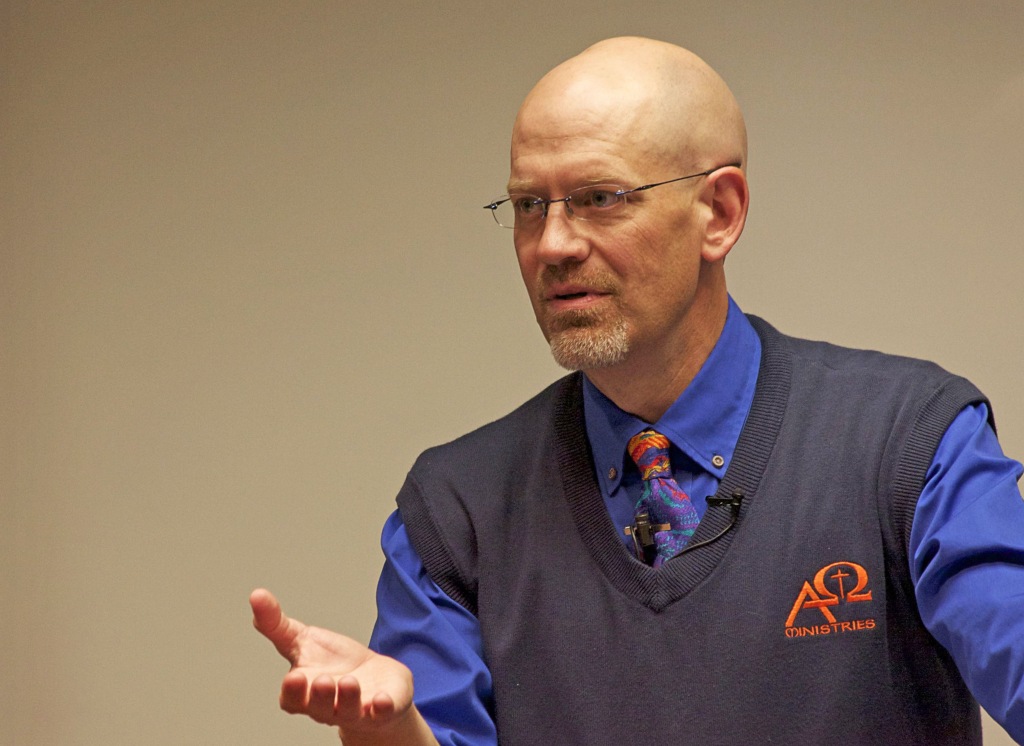
Dr. James White is a Reformed Baptist theologian and apologist and founder and director of Alpha Omega Ministries who, formerly premillennial and amillennial, recently shifted his eschatology to postmillennialism. I decided to explore that shift a little more deeply with him.
PAS: James, what leading factors contributed to your move from amillennialism to postmillennialism?
JW: I should first make it clear that I have truly sought to avoid the eschatological debate realm for many years. I was raised dispensational pre-millennial, and I still have the books and charts to prove it. I remember so well when Thief in the Night came out, and we watched it at our church on New Year’s Eve before midnight. I am still freaked out by the sight of an unattended, running lawn mower.
Likewise, I remember clearly, sometime in my junior year in high school, around 1978 or so, using the glow from my cool Tritium digital watch to read the text from Matthew 24 to my friends in the dark at a lock-in at the mega Southern Baptist Church I was a member of, explaining the budding of the fig tree, how long a generation was, and how Israel had become a nation in 1948. A few years later, as a dual Bible/Biology major in college (minor in Greek), I and some fellow Bible students plotted to buy Dr. Martin, our amillennial professor, a bunch of helium filled balloons and have them delivered to class with the note, “In case of rapture, hold on tight!” We didn’t do it only because we were Bible college students and could not afford it.
But shortly thereafter I became convinced that the hermeneutical method I was using for my premillennial views was inconsistent, and hence I had to abandon that view. However, not knowing about any other views to any depth, I became agnostic about the topic, calling myself a “panmillennialist,” as in, “it will all pan out in the end.” I knew one had to have an eschatology proper, relating to judgment, the coming of Christ, resurrection, the final state, etc., but I had come to the conclusion that these debates produced far more heat than they did light, and I lost all interest.
Years after graduating from seminary I listened to a series of lectures from an amillennial lecturer on “this age and the age to come,” thought, “Hey, that makes sense, and is nice and simple,” and adopted the view. I read a few more works on the topic, and adopted it mainly because I knew I could not speak and write on systematic theology while maintaining eschatological agnosticism. But I still did not find the field compelling or interesting. I had not yet seen how it is necessarily related to how one decides key issues about the church’s purpose and future.
When I moved to Apologia Church a few years ago I found myself more directly and openly surrounded by postmillennialists. My fellow Pastor Jeff Durbin was preaching through Matthew, and hit Matthew 24 right as I became a member. It was not long until I entered the eldership, and so the issue was more clearly a part of my thinking. I was asked to read Dr. Joseph Boot’s The Mission of God, as Apologia basically refers to it as a manifesto of sorts for the church. This led to further reading in other authors as well.
But the biggest factor was 2020, the year when it became clear that a global, purposeful movement headed straight into secular technocratic totalitarianism was on the fast march. The pandemic panic, combined with a CCP-style totalitarian mindset, was causing a rapid slide directly into a dark abyss, and I began thinking very seriously about what this meant to the faith, and, especially now as I have grandchildren, the oldest of which is heading into her teen years, how we can communicate the faith to the generations yet to come.
PAS: What specific biblical texts or theological constructions most contributed to your change?
JW: In my “coming out” sermon, I focused upon what had truly pressed me to take a stand on the topic. Postmillennialism is a top-down theology. It begins with over-arching themes that flow naturally and beautifully from Reformed theology. Instead of starting down at the bottom and trying to build up a system based upon interpreting symbols and apocryphal texts, postmillennialism starts with the over-arching purpose of God in Christ. As I studied Psalm 110, Psalm 2, Isaiah 42, and saw how these texts are central to the Apostolic understanding of the church, time, and the future, I was forced to deal with the divine promise that Christ will triumph, not just in a spiritual sense, which all positions take as a given. The phrase in Psalm 110:2, “rule in the midst of Your enemies” struck me. This is a command, an imperative, and it is not about ruling in heaven while Christ’s enemies hold full sway upon earth. Jesus did not say all authority in heaven alone had been given to Him. And surely the promise of Psalm 2:8 must be fulfilled. Could Jesus fail to ask for the nations, and would the Father fail to sovereignly comply? These, together with the key text in 1 Corinthians 15:20ff, came together to provide the over-arching intertextual themes and fulfillment that I had not found in any other understanding.
PAS: Has this shift altered your existential outlook on the church and society in any way?
JW: That shift was taking place due to my discussions with my fellow elders at Apologia, but certainly once I saw the incredible consistency of the biblical testimony at the highest level of the fulfillment of the purposes of the Father and the Son, seen prophetically in the Hebrew Scriptures and fulfilled in the New Testament, I could not avoid making my decision.
The postmillennialism I am espousing recognizes God is fulfilling His purposes in time, and that includes judging nations and empires. There have been very dark times since the resurrection. As one who has taught church history for decades, I well knew there was no simple, straight line of “improvement” in the world from the first century until now. And as we face a possible period of deep and prolonged darkness, I now look at the situation not in an escapist mindset, but in an endurantist mindset. What if secularism with all its related falsehoods amounts to the greatest challenge to Christ’s lordship ever seen? And what if it is His intention to destroy these falsehoods with such power that they will never again afflict the minds of the human family? And what if that means allowing them to hold sway for decades, even centuries, so that their full depth of emptiness can be known for all time? Will we give up our hope even in such situations? We cannot, and I now have a context in which to remain faithfully joyous and hopeful even in the darkest situation, for the same one who promised His holy One would not see decay (and hence brought about the resurrection itself) likewise promised ultimate victory to the One who must reign until every enemy has been put under His feet.


Leave a comment